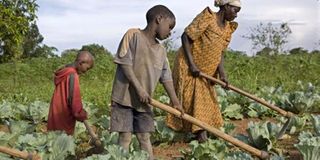Farmers complain over budget allocation to agriculture sector

A mother and his two children attend to their vegetable garden recently. File photo
What you need to know:
- Naads is projected to take about 38 per cent of Shs828.5b in the 2017/18 financial year for supplying farm inputs to various farmers.
- Mr Kasaijja said in the Budget government is aiming at ensuring efficient and effective provision of critical agricultural public goods, and services to increase production and productivity of agricultural commodities and enterprises; access to critical farm inputs and improve access to markets and value addition and strengthen the quality of agricultural commodities.
KAMPALA. The Agriculture sector, which is arguably the biggest contributor to the economy, received Shs828.5b from the Budget released yesterday (about 3.8 per cent).
This is despite the country being a signatory of the Maputo Commitment and the 2014 African Union declaration to allocate 10 per cent of the national budget to agriculture and grow agriculture by 6 per cent.
The Finance minister, Mr Matia Kasaijja, presented the Budget that showed that the sector budget increased slightly by Shs5.1b from Shs823.4b in the 2016/17 Budget (4.0 per cent) to Shs828.5b in the 2017/18 Budget (3.8 per cent).
Many farmers who talked to Saturday Monitor said Uganda’s population, which depends on agriculture for their livelihood, measures success from a good harvest and good weather, so the Budget should have put more money in improved irrigation to fight drought.
“Agriculture employs almost 80 per cent of Ugandans and getting a miserable 3.8 per cent of the Budget, i.e. Shs828.5b is so small to impact on the ordinary citizens across the country. We need more money for agriculture if we are to transform this country into a middle Income status,” said Mr Joel Cherop, a farmer in Kapchorwa District.
Mr Cherop said agriculture suffers crop losses due to vermin, poor or non-existent storage, lack of irrigation, shortage of fertilisers, lack of drying facilities, pests and diseases, adding that the Budget should have addressed these issues to better the agricultural sector.
Dr William Wogoire, the director of National Coffee Research Institute in Kituza, Mukono District, said the Budget should have emphasised the need to tackle current food security and climate change challenges which is affecting farmers.
Civil Society Budget Advocacy Group (CSBAG) consultant Patrick Katabazi wondered why the National Agriculture Advisory Services (Naads) continues to get huge amount of money yet its impact has failed to be seen for more than a decade.
Naads is projected to take about 38 per cent of Shs828.5b in the 2017/18 financial year for supplying farm inputs to various farmers.
He said in order for the agriculture sector to contribute more to GDP and development and to significantly reduce food insecurity, the sector requires greater investment by government to increase the productivity and competitiveness of smallholder farmers.
“To boost their potential, Uganda’s smallholders need more training, infrastructure, financial services, affordable inputs, and better access to markets,” said Mr Katabazi.
Government position
Mr Kasaijja said in the Budget government is aiming at ensuring efficient and effective provision of critical agricultural public goods, and services to increase production and productivity of agricultural commodities and enterprises; access to critical farm inputs and improve access to markets and value addition and strengthen the quality of agricultural commodities.




